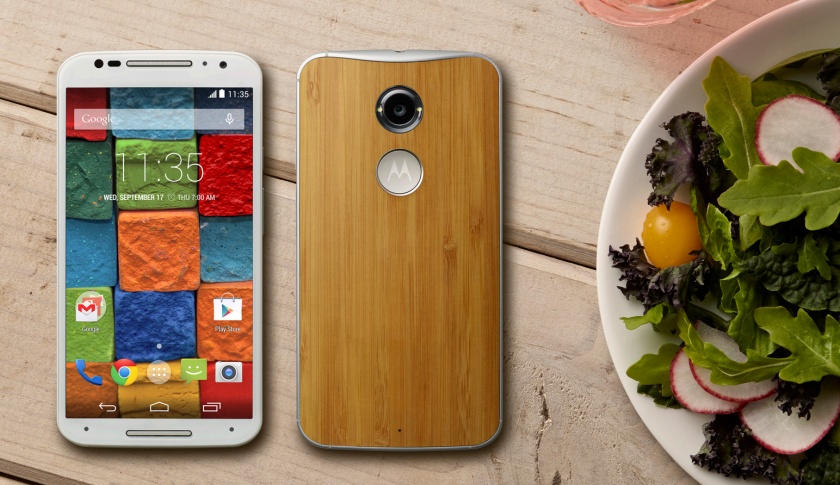(单词翻译:单击)
A few weeks ago I found myself on the eighteenth floor of the historic Merchandise Mart building in downtown Chicago, surrounded by dozens of anxious journalists awaiting a press conference for Motorola’s new phone. We were in a room splashed with vivid hues and packed with chairs of varying shapes and sizes, arranged in a semi-circle pattern. A nearby wall had a graffiti-like mural that read, somewhat perplexingly, “We want more” and “Thank you.” At the front of the room was a makeshift stage flanked by two televisions. A giant Ma Batwings “M” was plastered on each display.
几周前的一天,在芝加哥历史悠久的商业市场大厦18楼,我和其他几十位记者焦急等待着摩托罗拉(Motorola)新品发布会开幕。那间屋子的墙上涂满了各种鲜艳的颜色,形状大小各异的椅子围成一个半圆,簇拥着舞台。我旁边的一面墙上画着类似涂鸦的壁画,上面写着让人有些费解的两句话:“我们想要更多”和“谢谢你。”屋子前方搭着一个临时舞台,旁边摆着两台电视,上面各显示着一个像蝙蝠翅膀一样的“M”字母巨型Logo。

Welcome to the new, soon-to-be Lenovo-owned Motorola—it’s surprisingly like the old one.
欢迎来到焕然一新的摩托罗拉——它很快就将归入联想(Lenovo)旗下,虽然它像极了过去那个摩托罗拉。
As I waited for the proceedings to begin, I reflected on how much Motorola, long a stalwart of the U.S. electronics industry, had impacted my life. Sure, most people associate the name with the pioneering radio giant it once was. But, owing to the nature of cellular technology and mobile phones, Motorola has played an integral part in many people’s daily lives. For example, in high school I had a job selling cell phones, and I recall Motorola’s StarTAC being a tough sell. (It had a steep price tag.) Still, I was able to move inventory, a sign of things to come. Years later, I worked for Verizon Wireless, where I found myself bewildered at how well the Motorola Razr still sold well a full two years—eons in technology—after it arrived on the market. For much of my life, Motorola was a giant in technology. That’s not quite the case today.
趁着等待发布会开始的工夫,我回忆了一下作为美国电子行业一杆大旗的摩托罗拉公司多年来是怎样影响我的生活的。当然,一提起摩托罗拉这个品牌,大多数人马上会想起当年那个叱咤风云的无线电巨头。由于蜂窝技术和移动电话的特性,摩托罗拉曾是很多人生活中一个重要组成部分。比如在高中时,我曾干过一阵卖手机的工作,我记得当时摩托罗拉的StarTAC手机比较难卖(因为它的价格非常高)。不过最终我还是把存货都卖出去了,这是当时手机行业将迎来一个大发展的初步迹象。几年后,我进入美国无线运营商Verizon Wireless公司工作,我发现摩托罗拉的Razr手机在上市整整两年后依然卖得非常好,实在是令人费解——两年的时间在科技界可以说简直就像一个朝代那么久远。在我人生的大部分时间里,摩托罗拉都是当之无愧的科技巨头,但如今它早已不复当年的风光了。
(In 2011, the company split into a mobile devices business, Motorola Mobility, and an infrastructure business, Motorola Solutions. They share only a name; Motorola Mobility, after a brief period under Google, will soon be owned by Lenovo.)
2011年,摩托罗拉分裂成一家移动设备公司——摩托罗拉移动(Motorola Mobility),和一家基础设施公司——摩托罗拉解决方案(Motorola Solutions)。二者共享的只有“摩托罗拉”这个品牌。后来摩托罗拉移动被谷歌(Google)短暂收购,而今很快就将被联想控股。
But back to the event at hand. Rick Osterloh, the newly-appointed president of Motorola Mobility, took the stage wearing a smart watch on his left wrist. “Choose to have the freedom to choose,” he declared. It would turn out to be the day’s theme. Osterloh and company went on to introduce two new phones, the Moto X and Moto G, that could be customized front to back. They introduced a highly-anticipated Google Android-based watch, theMoto 360, which came in different colors and with various bands. Finally, they showed off the Moto Hint, a futuristic Bluetooth headset, available in an assortment of colors and materials.
再回到这次发布会上来。摩托罗拉移动新任首裁里克o奥斯特洛左手戴着一支智能手表走上舞台。他喊出“自由选择你的选择”,这句口号也成了当天发布会的主题。奥斯特洛介绍了两款新手机Moto X和Moto G,这两款手机的所有组件都可以定制。另外摩托罗拉还发布了一款备受瞩目的安卓(Android)智能手表——Moto 360,用户可以选择不同颜色和多款表带。最后,摩托罗拉展示了一款名叫Moto Hint,极具未来主义风格的蓝牙耳机,它也可以选择不同的颜色和材质。
The new Moto X, in particular, was notable because it was the company’s second shot at introducing a market-moving device. The first model of the phone, the company’s flagship model, launched in late 2013. It was Motorola’s attempt to lay claim to a new supremacy—the handset was competitive, customizable, affordable, and assembled in the United States. Despite always-on voice commands and an all-day battery, the phone never gained traction, and always seemed to be on sale. When his presentation was over, I pressed Osterloh on why the phone’s price seemed to be in a constant flux. “We learned a lot about what it took to succeed in the premium smartphone business when we launched the Moto X,” he told me. “For us, we found the sweet spot was about one- to two-hundred dollars below Samsung and Apple.” As such, the new Moto X retails at $499 without contract, about $150 lower than comparable Apple or Samsung devices.
新Moto X是摩托罗拉试图在手机市场力挽狂澜的第二次发力。作为摩托罗拉的旗舰手机,第一代的MotoX发布于2013年年底。这款具有竞争力,可以定制的手机价格低廉,而且是在美国组装的。尽管它可以随时使用语音控制功能,电池续航也可以支持一整天,但它自始至终没什么市场吸引力,而且好像总是在降价。等到奥斯特洛的讲解完毕后,我问他为什么Moto X的价格总是在波动,他答道:“当我们推出Moto X的时候,我们做了大量工作,研究如何在高端智能手机市场获得成功。我们发现它的最佳价格点是低于三星(Samsung)或苹果(Apple)100到200美元。”因此新Moto X的裸机零售价为499美元,比苹果或三星的同级产品低了150美元左右。
Another theme that echoed during the presentation was that of “Pure Android.” Awash in a sea of customized versions of Google’s Android mobile operating system, Motorola has chosen to take the foundation of code Google releases to its partners and leave it mostly untouched. The company sees it as a point of differentiation. It touts it as a “Vanilla Android” experience, perhaps the first time in the history of blinking, buzzing consumer electronics in which “plain” was equated with “preferred.” The result, it says, is a faster, leaner device that’s capable of receiving major software updates sooner than the more customized phones on offer by every other manufacturer.
在这次讲解中,另一个获得广泛反响的主题是所谓的“纯净版安卓”。在安卓系统的机海大军中,各家厂商的订制安卓版本也是不计其数,摩托罗拉则选择了谷歌提供给各大厂商的原始代码,几乎原封未动。摩托罗拉似乎认为“原汁原味”也是一个差异点。它把安卓的这个版本称为“香草安卓”(Vanilla Android),这可能也是习惯耍酷炫,玩噱头的消费电子产业第一次把“原生版”与“更好”划等号。摩托罗拉表示,这个原生版系统能够比其他各大厂商的定制系统更快地获得重要软件更新。
Steve Horowitz, Motorola’s senior vice president of software, was insistent that the company’s restrained tweaks to Android could not be matched by any competitor. “One of things that I like, frankly, are features that people don’t even know are features,” he told me. He’s referring to a new feature in which you merely wave your hand over the phone’s display to silence an alarm or incoming call, rather than press, tap, or swipe as on other phones. “It’s almost like a natural gesture—’Oh, stop it,’ and it just works,” he said. It’s a neat parlor trick.
摩托罗拉高级软件副总裁史蒂夫o霍洛维茨坚称,摩托罗拉最大程度地保留了原装安卓系统,这是其他任何竞争对手所无法比拟的。他对我表示:“坦率地说,我最喜欢的一点是,这部手机上有一些人们甚至不知道是某种功能的功能。”比如Moto X的一项新功能是,当闹钟响起或者有来电时,你只要用手挥过显示屏上方就可以静音,而不用像其它手机一样需要又按又划的。他表示:“它简直就像一个自然而然的手势——‘噢,快停吧’,然后它就停下了。”显得非常有逼格。
Whether such subtleties are enough to send the masses back to the store and pay a premium for a Motorola device remains to be seen. The company continues to be in transition, and that narrative has hijacked most everything related to the products it makes. Its new and highly touted Texas assembly plant is expected to close as final assembly moves to China, Lenovo’s home. The Midwestern company is still recovering from its whirlwind marriage to (and divorce from) that beacon of Silicon Valley, Google. And the Lenovo deal isn’t even expected to close until 2015, leaving it in limbo for the rest of the year. If its executive team can put all the corporate drama behind it and focus once again on making compelling devices—Droid, anyone?—they could very well take advantage of a lot of latent goodwill for the company, at least in the U.S.
但是,这些别出心裁的功能能否吸引大批消费者回到摩托罗拉的柜台,并心甘情愿地花高价买一部摩托罗拉手机,还有待观察。摩托罗拉目前仍处于转型阶段,但这次艰难的转型也几乎“劫持”了它旗下生产的所有产品。随着摩托罗拉的最后一条组装线迁至联想的老家——中国,曾经被高调宣传的位于德克萨斯州的摩托罗拉新工厂也将关闭。另外,摩托罗拉现在还没有从跟硅谷大鳄谷歌的“闪婚闪离”中恢复元气。联想收购摩托的交易预计要到2015年才能完成,因此,从现在到年底这段时间,摩托罗拉都将处于进退两难的处境。如果公司的高管团队可以把收购大戏先放在一边,全力研发有吸引力的设备——比如新的Droid手机,那么至少在美国,它还可以利用深埋在人们心底的“情怀”再赚上一笔。
Motorola has the freedom to choose. Now it just needs to do it.
摩托罗拉拥有选择的自由。现在它只需要放开手做出选择。


